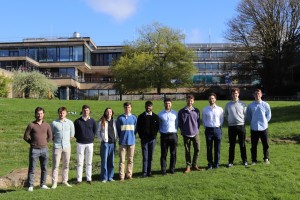A team of engineering students at the University of Bath have become the first in the world to successfully build and run a hydrogen-fuelled engine.
The 15-strong Bath Hydrogen team made the breakthrough with their hydrogen-powered internal combustion – or H2ICE – engine, pictured.
Engines of this type are not currently commercially available, although major automotive manufacturers are developing the technology.

The team, pictured below, is made up of third and fourth-year students studying courses such as Mechanical Engineering, Automotive Engineering, Integrated Mechanical and Electrical Engineering. It was formed as a follow-on to Team Bath Racing.
One of the UK’s most successful Formula Student racing teams, Team Bath Racing was wound up in 2022 following a decision to focus on zero-emission vehicles instead of continuing to develop petrol-engined racing cars.
Now Bath Hydrogen, who are now aiming to set a new land speed record, were delighted when their prototype engine ran at the first attempt last month.
Bath Hydrogen technical lead Nicholas Burt, who is studying for and MEng in Mechanical Engineering, described it as a nerve-wracking moment.

“It was a great validation of all our hard work,” he said. “We are using a testbed now before moving on to adapting the engine we’ll make the record attempt with, and we’ve learned so much about how to redesign and engineer that through this process.
“The support we’ve had from our early sponsors and from around the university has been invaluable.”
The project started last year as a part of the team members’ studies with none of the members at that stage having prior knowledge of hydrogen fuel or what was required to make the engine a reality.
Hydrogen has many advantages over petrol as a fuel – the main one being no CO2 production at the point of use – but it also presents many challenges.
It has a very high energy density per unit mass but a very low energy density per unit volume, making it difficult to store sufficient fuel in the vehicle.
The solutions are to either store hydrogen as a compressed gas at very high pressure, or a liquid at around minus 250°C – both of which present significant difficulties compared to petrol.
Bath Hydrogen team leader Samuel Ray, who is studying for and MEng in Mechanical with Automotive Engineering, said: “We started by reading all of the research and literature we could find, analysing and cataloguing it all to understand it and prioritise what was possible for us to pull off, as a fairly small team.
“We are lucky to have received help and equipment from our sponsors, as hydrogen-fuelled engines work very differently to normal petrol ones and require different parts that are not commercially available.”
Bath Hydrogen chose to focus on creating a hydrogen-powered race car in light of the molecule being a potentially zero-carbon fuel, as well as the upcoming ban on sales of new petrol and diesel cars from 2035, and also because of the university’s significant research expertise in using hydrogen as a fuel and energy storage medium.
The Bath Hydrogen engine is a modified version of a single-cylinder petrol model, donated by US manufacturer Vanguard, a sponsor of the team. It was chosen as a testbed due to its relative simplicity, potential for adaptation and Vanguard’s generous support.
The team’s academic supervisor Dr Kevin Robinson said: “Many of us believe that the internal combustion engine still has an important role to play in moving towards net-zero, using hydrogen and synthetic fuels in certain niche areas.
“Getting the prototype engine running has been a very significant milestone in this project. It’s still early days but we have completed about three hours of continuous operation so far, including several minutes at full load.
"All the systems put in place are working well and are producing valuable data. There is a lot of work still to do but this has been a very promising start.”
Bath Hydrogen’s other sponsors include New Zealand-headquartered engine control unit manufacturer Link Engine Management, Leicestershire-based engine tech firm Clean Air Power, Surrey-based engineering consultancy Frazer-Nash, The Bugatti Trust, German software and engineering services firm Vector and Bath specialist valve manufacturer Rotork.
Also supporting the team are Rapid Harness, Easy Composites, De Spong Enterprises and Solenoid Valves, as well as the University of Bath and its world-leading Institute for Advanced Automotive Propulsion Systems (IAAPS) research and innovation facility.



















